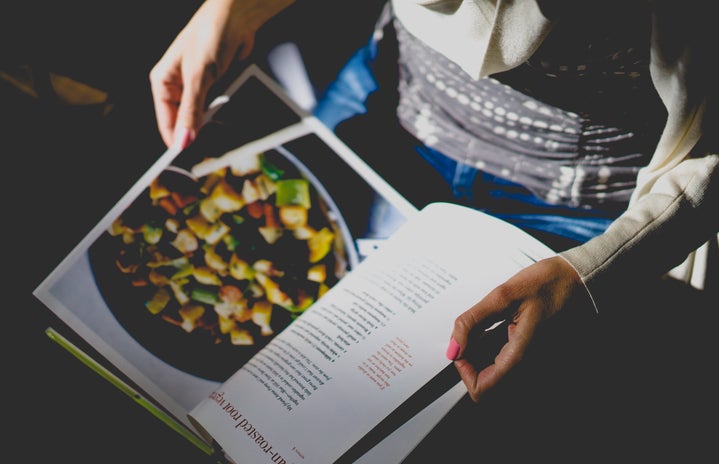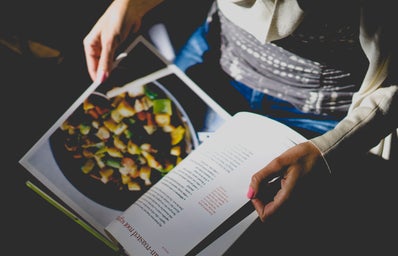“So what’s in the smoothie?”
“You know, a banana, frozen berries, milk—”
“Skim milk?? I read the other day that skim milk actually has SO much sugar in it. It’s SHOCKING. It’s amazing the poison you put in your body without realizing.”
The internet loves to put the fear in us about food. But how do you know what’s true and what’s not?
When this information was sprung upon me by my paleo-crazed coworker, I stopped putting skim milk in my coffee for a week because I was convinced it was going to give me diabetes. A basic understanding of nutrition could have told both myself and my co-worker that lactose is in fact, a natural form of sugar. Not like Mini Eggs sugar, the good kind.
This anecdote serves as a valuable lesson on the ways in which we have begun to rely on hearsay, not to mention endless Pinterest recipes, as a means of monitoring our nutrition. It should seem obvious, but information from actual nutritionists is likely more valuable. (Also, Dr. Oz is not a nutritionist. I’m pretty sure he’s a surgeon.)
The Vancouver Sun’s Randy Shore recently published an article in which he interviewed UBC Nutrition professor Judy McLean about the increasing trend of ‘Food Tribes’. The article goes onto explain how most cultures outside of North America have specific, long-standing traditional diets that are an integral part of their national identity. In North America, the continents melding-pot structure leaves most of us with an unformed idea of what an appropriate diet is. With obesity now a major source of cultural anxiety on our continent, subscribing to specific, usually restrictive diets in the hopes of improving health and life longevity has become overwhelmingly trendy.
And while it’s safe to say that more fruits, vegetables and whole grains, and significantly less Big Macs will probably lead to a healthier life, the health conscious community seems to be taking more and more extreme measures in order to find their various ‘nutritional niches’. Among those that Shore highlights are gluten-free, vegan and vegetarian, and low sodium. And of course there are dozens more. A simple scroll through your Instagram feed will likely reveal dozens of pictures of green smoothies, quinoa salads, and a billion different uses for chia seeds. Remember when chia seeds were only for chia pets? A simpler time it was.
The main problem with these food trends that Shore outlines is that many of them are based on observational studies, which rarely consider variations in the body types and lifestyles of participants. Furthermore, most of these studies turn out incredibly inconsistent findings. This is probably obvious to those of us who have used the internet to try and figure out whether or not red wine is good for you. Shore’s conclusion? Moderation is key. Less calories and more exercise will make you healthier, but it’s difficult to say what specific foods will help you look and feel your best.
Seems like a pretty obvious conclusion. And yet, so many of us are dropping mad dollars at Whole Foods, buying as many chia seeds as humanly possible and hoping for the best. It appears to me that the allure of these various ‘Food Tribes’ comes from the increasingly visual and global networks we participate in on the Internet. Our diets are now being controlled by a desire to keep up with the Jones’s. And by the Jones’s, I mean that girl who compulsively pins avocado-centric recipes. And who knows? While she was posting those recipes she may have been eating an entire ice cream cake.
She was probably eating avocado ice cream cake, though. Weirdo.
We’ve stopped listening to our bodies wants and needs, a practice that can have serious health benefits, and are blindly jumping on any bandwagon that promises to make us as toned as Michelle Obama’s arms. For example, there are many people who are born celiac, which means that gluten will literally kill them. But now, people everywhere are passing up complimentary bread sticks to avoid a little bloating. To which I will say, “More bread sticks for me, I wore boyfriend jeans to this fancy dinner.”
At the end of the day, we all know what foods are good for us and which ones we should avoid. Nutritional pyramids taught us that in the third grade. However it’s also safe to say that in reality, there’s no real way of knowing what will give you a longer life. If the concern is really our health and longevity, not just a number on a scale, extreme measures are certainly up for debate.
I have two Italian grandparents, both in their early 90’s, still living without aid and able to do their own gardening and grocery shopping. Their diet consists mainly of white bread and pasta. They also lived through a World War AND the Great Depression. So if gluten, dairy and meat are in fact killing them, they’re killing them very very slowly. Sure, replacing all of your meals with kale juice might make you live longer, but you could also die in a freak snowboarding accident this weekend. So if you hate kale, maybe just eat a bagel. Unless you choke on it, it probably won’t kill you.
Yeah, that is a kale bagel. For those readers who want to have their kale, and bagel it, too.
Check out the full Vancouver Sun article here!

